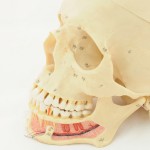
The lingual and inferior alveolar nerves are potential at risk of damage during some oral and maxillofacial surgery procedures. Fortunately the majority are temporary, with resolution taking place within 8 weeks. Injuries of 6 moths or greater are considered permanent and a range of techniques have used. The aim of this review was to evaluate the effects of different interventions and timings of interventions to treat iatrogenic injury of the inferior alveolar or lingual nerves.
Searches were conducted in the Cochrane Oral Health Group’s Trial Register, Cochrane Central Register of Controlled Trials (CENTRAL), Medline and Embase databases with no restrictions on the language or date of publication. Randomised controlled trials (RCTs) involving interventions to treat patients with neurosensory defect of the inferior alveolar or lingual nerve or both as sequelae of iatrogenic injury. Standard Cochrane methodological procedures were followed.
- Two studies that evaluated a total of 26 patients were included.
- Both studies were considered to be at high risk of bias.
- Patient-reported altered sensation was partially reported in one study and fully reported in another.
- Following treatment with laser therapy, there was some evidence of an improvement in the subjective assessment of neurosensory deficit in the lip and chin areas compared to placebo, though the estimates were imprecise: a difference in mean change in neurosensory deficit of the chin of 8.40 cm (95% confidence interval (CI) 3.67 to 13.13) and a difference in mean change in neurosensory deficit of the lip of 21.79 cm (95% CI 5.29 to 38.29). The overall quality of the evidence for this outcome was very low; the outcome data were fully reported in one small study of 13 patients, with differential drop-out in the control group, and patients suffered only partial loss of sensation.
- No studies reported on the effects of the intervention on the remaining primary outcomes of pain, difficulty eating or speaking or taste.
- No studies reported on quality of life or adverse events.
- The overall quality of the evidence was very low as a result of limitations in the conduct and reporting of the studies, indirectness of the evidence and the imprecision of the results.
The authors concluded
There is clearly a need for randomised controlled clinical trials to investigate the effectiveness of surgical, medical and psychological interventions for iatrogenic inferior alveolar and lingual nerve injuries. Primary outcomes of this research should include: patient-focused morbidity measures including altered sensation and pain, pain, quantitative sensory testing and the effects of delayed treatment.
Comment
This Cochrane review lists a wide range of reported interventions for treating iatrogenic nerve damage:-
- Surgical intervention.
- External neurolysis:
- Internal neurolysis:
- Neurorrhaphy:
- Neuroma excision:
- Autologous nerve grafting:
- Tubulization:
- Laser treatment.
- Medical treatment.
- Counselling.
However their detailed searches could only find two RCTs evaluating low-level laser treatment in a small number of patients. Consequently, as the authors suggest there is much work required to reduce or prevent initial damage and to recognise and support those patient who do suffer these injuries. In addition high quality RCTs need to be conducted to identify the most effective procedures.
Links
Coulthard P, Kushnerev E, Yates JM, Walsh T, Patel N, Bailey E, Renton TF. Interventions for iatrogenic inferior alveolar and lingual nerve injury. Cochrane Database of Systematic Reviews 2014, Issue 4. Art. No.: CD005293. DOI: 10.1002/14651858.CD005293.pub2.

“@TheDentalElf: Little evidence available on treatments for iatrogenic injury to inferior alveolar or lingual nerves http://t.co/tkviIIux25”